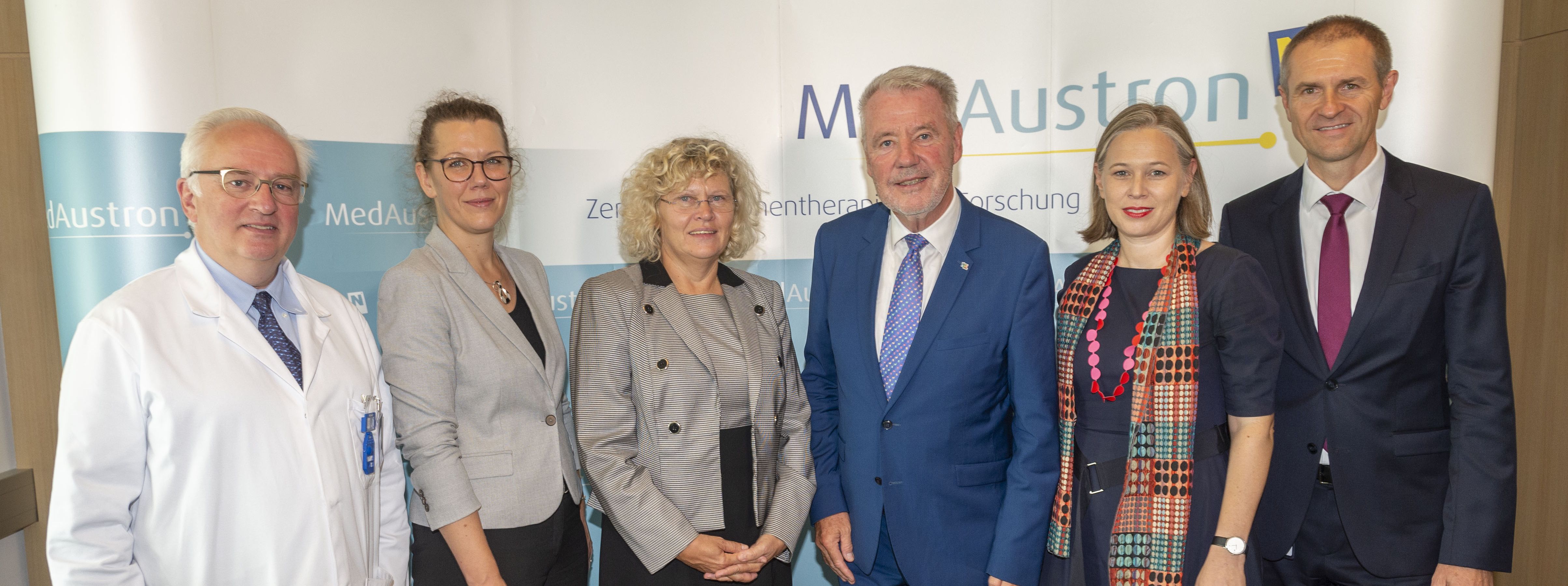
(Vienna Neustadt, 25-09-2019) MedAustron, the Medical University Vienna and the Technical University Vienna have been cooperating successfully in the research sector for many years. During yesterday's World Cancer Research Day, the partners presented the new research program, which continues already successful projects, sets new emphases and involves additional research partners. One essential requirement - the availability of carbon ions and protons in the highest energy level - exists in recent times and provides the foundation for exciting project, which ultimately contributes to the treatment of cancer.
Next to the treatment of cancer patients, research has occupied a permanent place at MedAustron from the onset. The facility in Vienna Neustadt is the only particle therapy centre in the world where research not only has its own radiation room, but which can provide particle accelerator protons also in energies, which are clearly above those of the clinical application. Under these conditions, the research have the opportunity to examine international competitive topics which are compiled in the latest research program 2019-2021. This research program is headed by Dietmar Georg on behalf of the MedUni Vienna, as a scientific coordinator across institutes and universities, together with Thomas Schreiner from MedAustron.
The science operation with the provision of protons began at MedAustron as early as in 2016. During the first years, the research teams of both universities authored more than 50 scientific papers and approximately 30 publications. The new program is based on the generated expertise and also considers the expanded usage spectrum based on now available carbon ions and higher proton energies.
"MedAustron illustrates superbly the closeness of research to people. It is a unique project worldwide - it is cancer therapy and research centre in one. As a cancer therapy centre, MedAustron fulfils an important social and health policy task, and as a research centre, it is one of the lighthouses in our country. Our objective includes enhanced treatment options for seriously ill Austrians; the technical developments are primarily designed to contribute to the improved treatment of cancer patients, as well. At the same time, it generates an extended spectrum of research options. The Republic of Austria has supported this new facility with €40 million", so Minister for Research, Iris Rauskala.
"With MedAustron in Vienna Neustadt, Austria has a high-quality research infrastructure which provides Austrian scientists with unique options in many sectors. For the TU Vienna, it is non-clinical medical radiation physics, e.g. with the development of a new tomography process or the examination of the interaction of secondary radiation and tissue to prevent damaging healthy tissue, as well as the scientific further development of accelerators for medical purposes", Sabine Seidler, Editor of the Technical University Vienna, describes the cooperation.
"MedUni Vienna has a unique infrastructure in MedAustron to research the biological and physical principles of the ion therapy. At the same time, this cooperation also supports our general, strategic interest in the translation of research results into practice - this will be very beneficial with the partners and the opportunities at MedAustron", says Michaela Fritz, Vice Headmaster for research and innovation of MedUni Vienna.
Klaus Schneeberger, Chairman of the Board of MedAustron, emphasises: "The knowledge about the mechanisms of this illness increase rapidly in the sector of cancer therapy. It is our objective at MedAustron to contribute to improved diagnosis and therapy procedures. At MedAustron, we are able to actively contribute to cancer therapy and research being united on top international level. I am confident that, in future, we can expect many new insights for the benefit of cancer patients due to the professional and committed teams of the Universities and MedAustron as well as the support from the Ministerium for Science."
The topics of this research program comprise the sectors of intra-fractional and inter-fractional adaptive radiation therapy, imaging with ion rays, magnetic-resonance-supported particle therapy, energy transmission mechanisms and applications in biology and physics as well as pre-clinical research. On one hand, the documented focal points reflect the topics of ion radiation research prioritised throughout Europe and, on the other, also account for the clinical requirements at MedAustron by their complete compatibility with the schedule for the introduction of new innovations. Thus, MedAustron, as an outpatient clinic is highly interested in methods for the treatment of mobile target volume or the research of as yet untapped potentials of carbon ion therapy, in order to design innovative clinical studies and ultimately increasing the spectrum of tumours treatable by way of ion therapy.
According to the excellent expertise of the institutes, research projects are currently mainly performed in cooperation with the Medical University and the Technical University Vienna. In addition, there are close collaborations also with the University of Applied Sciences Vienna Neustadt, the Institute for High-Energy Physics of the Austrian Academy of Sciences and the Medical University Graz.